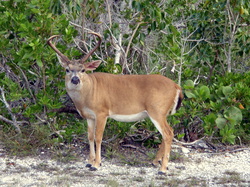 Florida is home to the most endangered species of any state. One of the most threatened (and certainly one of the most endearing) is the Key deer (Odocoileus virginianus clavium). The Key Deer is a subspecies of the more familiar white-tailed deer (O. virginianus) and is the smallest deer in North America. Whereas white-tailed deer may stand over 120cm (47in) at the shoulder and weigh over 90kg (200lb), the diminutive Key deer rarely exceeds 75cm (30in) and weighs between 25-34kg (55-75lb). The fawns (newborn deer) are actually the size of house cats and make Bambi look like a moose. As their name implies, Key deer are only found on the islands of the Florida Keys, situated off the southern tip of the Florida peninsula. Scientists believe they arrived 22,000 years ago during the Wisconsin glaciation episode when lowered sea levels created natural land bridges from the mainland. Rising sea levels isolated this population of deer, and as with many island species, started to favor smaller and smaller individuals because of limited space and resources. This is one of the reasons that islands tend to be home to high levels of biodiversity and many subspecies. Key deer are well suited to their island habitats; slipping nimbly through dense tropical hammocks, feeding on the seedlings of red, black, and white mangroves and the berries of thatch palms, and swimming between islands in search of fresh water. During the rainy months, Key deer may travel up and down the entire island chain, but will return to the southern keys in dry months, where limestone wells and pockets of fresh water can reliably be found. Due to habitat loss and poaching Key deer almost became extinct in 1950, with some population estimates as low as 25 individuals. The creation of the 8,500 acre National Key Deer Refuge in 1957 was the start of a slow recovery that continues to this day. Key deer are listed as endangered under the United States Endangered Species Act and have a standing population of between 300-800 individuals. The primary cause of death for Key Deer (70% of annual deaths) is car strikes along US 1, the main road which runs through the keys. Efforts to expand the National Key Deer Refuge by 1,000 acres through the purchase of private land have met with limited success, but population levels appear to be stabilizing on surrounding islands. If you wish to see Key deer, they can often be found at dusk along the back-roads of Big Pine and No-Name Key. Unlike their northern cousins, Key deer are typically unafraid of people, so if you ever have the privilege of seeing these wonderful animals, please remember it is illegal to feed or pet them. If you’d like to help conserve Key deer, the Key Deer Protection Alliance are active supporters of Key deer protection projects. If you live in South Florida, they hold regular meetings (next one March 13), but you can also donate to support their work or shop on AmazonSmile and select them, in which case Amazon will donate 5% of what you spend to KDPA. Finally, if you live in or visit South Florida, respect the speed limits throughout the keys, especially around Big Pine Key and especially at night. It’s one small way in which we can all help ensure Key deer survive for future generations.
2 Comments
|
Field Notes
Archives
July 2021
Categories |
|
Partner with us! We are always looking for new schools, scientists, and non-profit organizations to partner with. Please contact us here to start a conversation.
Hear from us! Sign up for our newsletter to hear about what is happening at Field School as well as upcoming offers and specials. |

 RSS Feed
RSS Feed